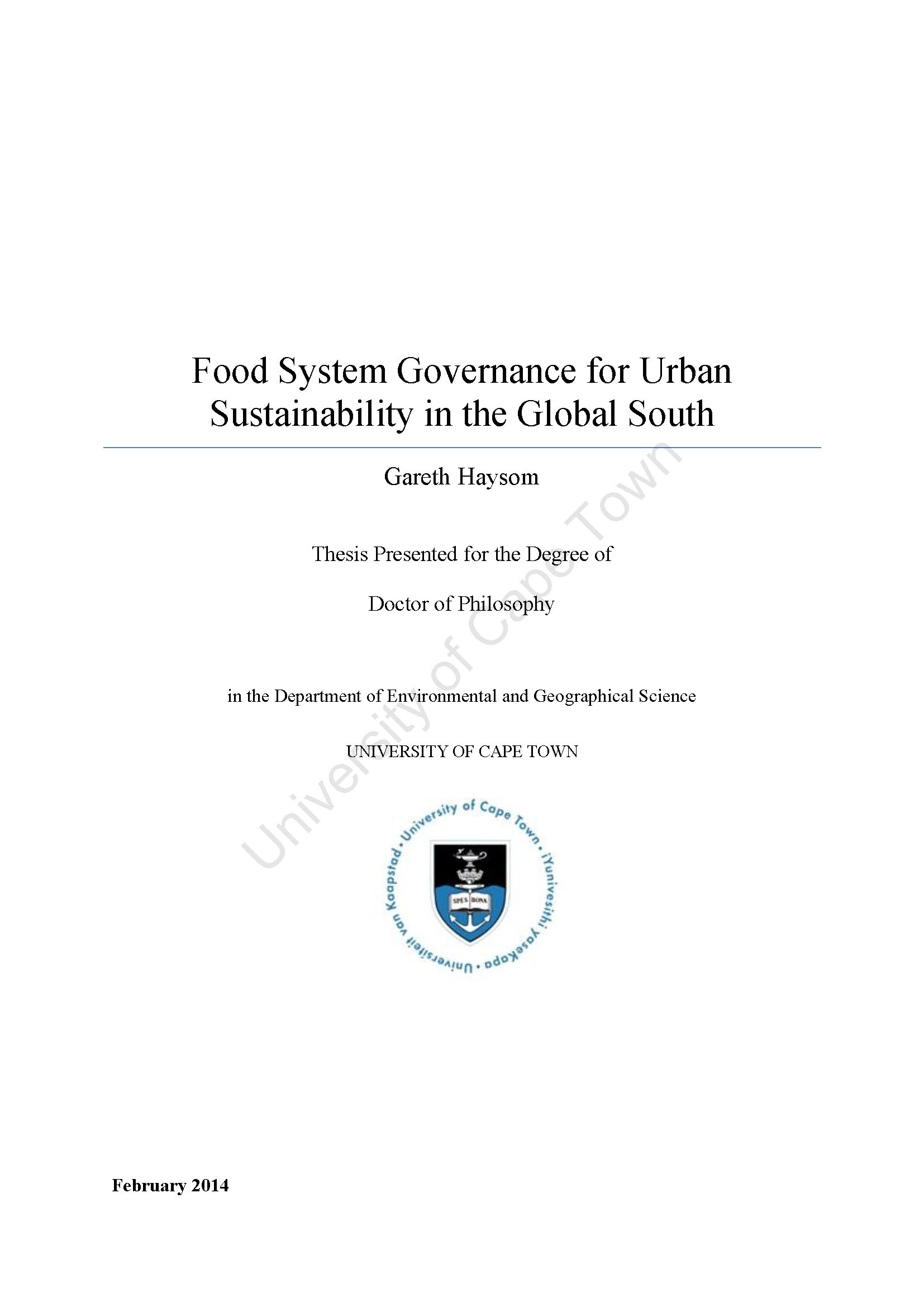– PhD Thesis –
Food security remains a persistent global challenge. Food security is defined as a situation where all people, at all times, have physical, social and economic access to sufficient, safe and nutritious food which meets their dietary needs and food preferences for an active and healthy life. The Food and Agriculture Organisation 2013 State of Food and Agriculture review reports that in excess of 868 million people, 12 percent of the global population, are undernourished. Global inequalities mean that this challenge is disproportionately experienced. Food insecurity manifests most severely in specific geographies. Global demographic changes have resulted in shifts in the locus of these experiences. Food insecurity in urban areas, particularly in developing countries, is a persistent yet poorly understood phenomenon.
Responses to food security have primarily focused on ensuring food availability, resulting in responses that are predominantly production-orientated. This approach presupposes a principally rural challenge and overlooks critical emerging urban food insecurity challenges. The production and rural dominance in efforts to ameliorate food insecurity have a number of consequences. The first consequence reflects a scientific and technology-driven focus on increasing or optimising net calories produced. Secondly, where access to produced food is constrained, welfare interventions are used to mitigate challenges. Such interventions are predominantly reactive and lack strategic focus. The third consequence, informed by the preceding two interventions, sees policies and legislation that reinforces the production/welfare paradigm. Such food security responses disregard the current transitions evident within society.
This thesis identifies a number of global transitions. Within the context of wider global change processes, focus is given to four inter-connected transitions. These transitions include the second urban transition, the food system transition and the nutrition transition. Fourth, driven by the preceding transitions, is the emergence of alternative urban food governance interventions.
The urban transition is most pronounced in developing countries and is particularly prevalent in South African cities. South Africa is over 60 percent urbanised. Addressing food insecurity within the growing urban communities requires a shift from traditional food security approaches. Internationally, in seeking to respond to the converging transitions, city governments are collaborating with urban residents to develop innovative urban scale food governance approaches. These urban food governance innovations are predominantly located in North America, with an increasing movement evident in Europe and South America. A gap exists in understanding the food governance roles, or absence thereof, in rapidly growing cities in South Africa and the Global South.
Understanding food governance trends and how these trends are responding to the urban, food, nutrition and governance transitions is the primary question with which this thesis seeks to engage. The question will be answered through a series of sub-questions. One vi of these questions seeks to understand what global food governance processes and practices are evident and what are the associated characteristics of these approaches.
Multiple food system actions and interventions were identified within the literature. The actions were categorised into four dominant typologies, referred to in this thesis as alternative food geographies, according to focus, politics and scale. One such alternative food geography reflected a focus on scale and a politics that sought to promote and support community food system solidarity. Within this alternative food geography, food policy council governance was a dominant approach.
This thesis then explores how relevant the emerging food governance approaches are to South African cities and if these can be effectively translated into action within the South African context. Comparative research was carried out in Canada through interviews with seven leading urban food governance actors and the participation in a number of food governance processes. Thirty interviews were conducted in Stellenbosch and Cape Town, supported by focus groups and immersion into the food governance processes. Data from food governance processes were analysed and collated to identify governance trends, approaches to the urban food challenges and the limitations of these actions.
While exercising caution of an uncritical adoption of international trends in food governance, informed by a review of current urban food governance interventions, key themes within urban food governance were identified. These themes included a clearly articulated scalar boundary, networked knowledge generation, participatory governance, inter-ministerial engagement, a deliberate pro-poor orientation and the use of research to inform strategic interventions. The themes were then considered within the context of the food security and food systems literature, supported by urban development and planning literature with specific attention being applied to issues of scale.
The urban food governance interventions of the two South African sites were in their infancy and had not been able to effectively inculcate food system governance into strategic management processes. The thesis concludes that within South Africa effective integration of the emerging interventions into key urban strategic governance remains limited, evidenced by an absence of formal policy and a lack of active engagement by key urban leadership. The rural production orientation still dominates the food security discourse and policy environment. City government has a critical role to play in enabling food security and has the convening authority to facilitate active engagement in broader food system interventions enabling food security.
This thesis contributes to an emerging body of work on urban food governance. It differs from earlier research on urban food actions in developing world cities in that it focuses on strategic policy orientated interventions and governance, avoiding the dominant, urban production and household focus narratives typically associated with urban food security. Considering urban food governance within the context of developing world cities contributes to new knowledge by highlighting the role of multiple stakeholders in governance, planning and specifically food access and food security.

